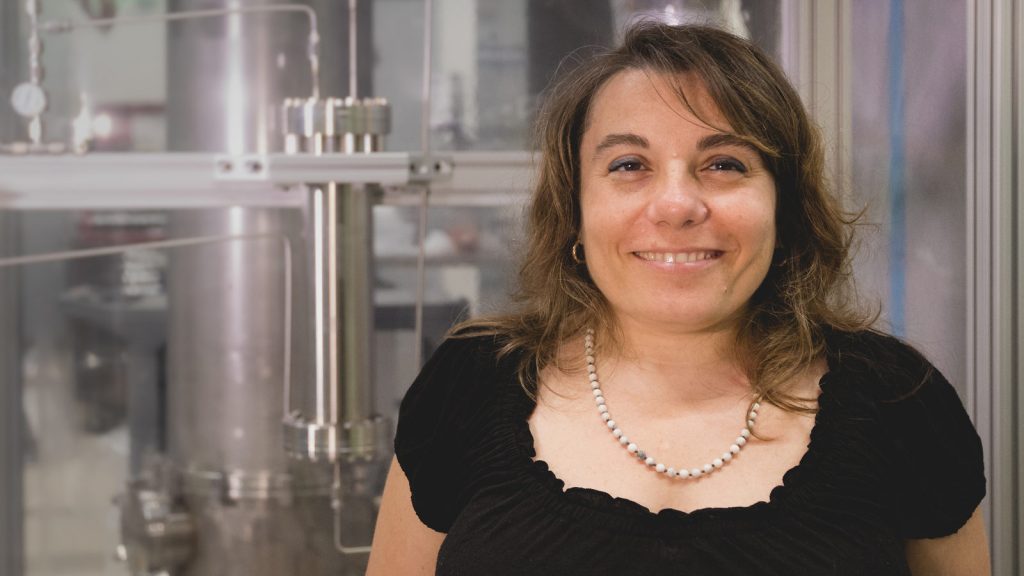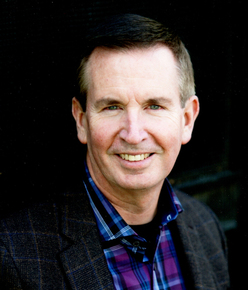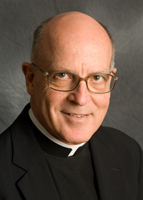ONLY WONDER KNOWS:
Humanity’s Irresistible Attraction To The Mystery Of Creation
by Dr. Maria Elena Monzani
How can we understand physical reality while being in it? Why is there something instead of nothing? Join Dr. Maria Elena Monzani, astrophysicist at the SLAC particle accelerator at Stanford, with Archbishop Salvatore Cordileone and other great minds as we explore these big questions and more.
“Concepts create idols; only wonder comprehends anything. People kill one another over idols. Wonder makes us fall to our knees” St. Gregory of Nyssa
COURSE DESCRIPTION
A recurring theme in our daily conversations is the apparent conflict between different methods for understanding nature and ourselves: faith, philosophy, science, medicine, sociology, psychology, etc. All these methods have one factor in common: they are driven by human curiosity, and by an attitude of amazement towards reality. But how is it even possible that we are able to understand physical reality, while being a part of it? In this course, we will examine this question from a variety of different viewpoints and discuss how, instead of contradicting each other, all these methods paint a coherent picture of humanity’s relationship with the cosmos.
SYLABUS
“Only wonder comprehends” – The experience of curiosity in the daily life of a scientist
“God saw how good it was” – The emergence of logos in the creation narratives
“And we came forth to contemplate the stars” – Early science in medieval Europe
“In the image of God he created them” – Hints of humanity from the archeological record
“What is mankind that you are mindful of them?” – Suffering and justice in the wisdom books

Dr. Maria Elena Monzani
Photo Courtesy of Farrin Abbott/SLAC National Accelerator Laboratory
As she grew up in the small town of San Pellegrino in the Italian Alps, three things conspired to make Maria Elena Monzani a physicist: a fascination for outer space, a Nobel Prize and a nuclear disaster. Monzani became the first in her family to go to college. She went on to get her PhD in neutrino physics from two European universities and started work at the US Department of Energy’s SLAC National Accelerator Laboratory in 2007. Today, she spends most of her work day preparing scientists around the globe to analyze data from a future experiment designed to detect signals of elusive dark matter particles – the stuff you don’t see when you look into the night sky, although it makes up about 85% of all matter in the universe. As deputy operations manager for software and computing on the LUX-ZEPLIN, or LZ, experiment, Monzani starts several days a week on the phone with the European contingent of a large international science collaboration that includes some 150 physicists and several engineers.
She worked on the XENON10 experiment at Columbia University as a postdoc before joining SLAC to work on NASA’s Fermi Gamma-ray Space Telescope, for which the lab built the principal scientific instrument. This instrument, called the LAT, has recorded in 10 years about the same amount of data that LZ will produce over its planned lifespan of three years.
When she’s not at work, Monzani shares her passion for science by giving talks to middle school children and her church community. “People always have a lot of questions,” she says. “No one thinks that space is boring—people have been studying the stars for ten thousand years.” And even though she now understands the basic forces and equations that explain the things that fascinated her has a child, she still comes to work each day with a sense of wonder. “The fact that we as humans have the ability to grasp that symmetry—we can write an equation that describes the solar system, the galaxy or the atom—that to me is mind blowing,” she says.
With special guests after each class!
Every course will conclude with a special guest to discuss the topic at hand.

Archbishop Salvatore Cordileone was born in San Diego in 1956. His roots run deep in San Diego. He attended Crawford High School, San Diego State University, the University of San Diego, and St. Francis Seminary in San Diego. He was ordained a priest of San Diego July 9, 1982. He was appointed Auxiliary Bishop of San Diego on July 5, 2002. He earned his Doctorate in Canon Law from the Pontifical Gregorian University in Rome. In 1995, he was called to Rome and served seven years as assistant at the Supreme Tribunal of the Apostolic Signatura, the Church’s highest canonical court. On March 23, 2009, Pope Benedict XVI appointed Bishop Cordileone as the fourth Bishop of Oakland. Three years later, on July 27, 2012, Pope Benedict XVI appointed him the Archbishop of San Francisco.
 John W Farrell is a writer and producer working in Boston. He is the author of The Day Without Yesterday: Lemaître, Einstein, and the Birth of Modern Cosmology from Basic Books, an imprint of the Perseus Books Group. A graduate of Harvard College with a B.A. in English and American Literature, Farrell has written for Skeptic, Commonweal, Cosmos Magazine, New Scientist, The Wall Street Journal, The Manchester Guardian, The Boston Globe, Salon, National Review, Huffington Post, First Things and The Tablet of London, and he writes a science/tech blog for Forbes. He was a 2010 Templeton-Cambridge Journalism Fellow in Science and Religion. His latest book, The Clock and the Camshaft, and Other Medieval Inventions We Still Can’t Live Without has just been published by Prometheus Books.
John W Farrell is a writer and producer working in Boston. He is the author of The Day Without Yesterday: Lemaître, Einstein, and the Birth of Modern Cosmology from Basic Books, an imprint of the Perseus Books Group. A graduate of Harvard College with a B.A. in English and American Literature, Farrell has written for Skeptic, Commonweal, Cosmos Magazine, New Scientist, The Wall Street Journal, The Manchester Guardian, The Boston Globe, Salon, National Review, Huffington Post, First Things and The Tablet of London, and he writes a science/tech blog for Forbes. He was a 2010 Templeton-Cambridge Journalism Fellow in Science and Religion. His latest book, The Clock and the Camshaft, and Other Medieval Inventions We Still Can’t Live Without has just been published by Prometheus Books.
 Rev. John J. Piderit, S.J. has been involved with educational institutions for most of his professional life. He received a B.A. degree from Fordham University, majoring in philosophy and mathematics. After completing theological studies in Germany and being ordained there in 1971, he secured his master of philosophy in economics from Oxford University (1974) and doctorate in economics from Princeton University (1979). From 1978 until 1990 Father Piderit taught international economics and statistics at Fordham University in New York City and lived in a student residence hall. His contact with students led him to found Queens Court Residential College, an option for freshman students who wanted a more intentional engagement in the intellectual life on campus and in the city. In 1990 Father Piderit moved to Marquette University in Milwaukee, where he served as Corporate Vice President for three years. From 1993 to 2001 Father Piderit was president of Loyola University Chicago where he separately incorporated the university medical center and introduced significant cost cutting in the non-medical parts of the university. In 2001 he became president of the Catholic Education Institute, a not-for-profit corporation promoting new approaches to the on-going education and formation of Catholics. Fr. John Piderit served as CFO of St. Patrick Seminary in Menlo Park and now serves as Vicar of Administration for the Archdiocese of San Francisco.
Rev. John J. Piderit, S.J. has been involved with educational institutions for most of his professional life. He received a B.A. degree from Fordham University, majoring in philosophy and mathematics. After completing theological studies in Germany and being ordained there in 1971, he secured his master of philosophy in economics from Oxford University (1974) and doctorate in economics from Princeton University (1979). From 1978 until 1990 Father Piderit taught international economics and statistics at Fordham University in New York City and lived in a student residence hall. His contact with students led him to found Queens Court Residential College, an option for freshman students who wanted a more intentional engagement in the intellectual life on campus and in the city. In 1990 Father Piderit moved to Marquette University in Milwaukee, where he served as Corporate Vice President for three years. From 1993 to 2001 Father Piderit was president of Loyola University Chicago where he separately incorporated the university medical center and introduced significant cost cutting in the non-medical parts of the university. In 2001 he became president of the Catholic Education Institute, a not-for-profit corporation promoting new approaches to the on-going education and formation of Catholics. Fr. John Piderit served as CFO of St. Patrick Seminary in Menlo Park and now serves as Vicar of Administration for the Archdiocese of San Francisco.
 Dr. Nina Sophie Heereman is Department, Chair and Assistant Professor for Sacred Scripture at St. Patrick’s Seminary & University in Menlo Park, California. She is an international speaker on topics related to Scripture and preaches retreats for youth, consecrated women, and lay people. Originally trained as a lawyer and after having passed the bar exam of the Free State of Bavaria, Dr. Heereman experienced a vocation to consecrate her life entirely to the service of the Church as a celibate lay woman in the study and teaching of the Word of God. She received an STB from the Pontifical Gregorian University, an SSL from the Pontifical Biblical Institute, and the SSD from the École biblique et archéologique française de Jérusalem. Prior to coming to the US she has taught as a visiting professor at the Collège des Bernardins in Paris, and the Pontifical Biblical Institute in Rome. She is a regular contributor to Radio Horeb and Die Tagespost in Germany and offers weekly reflections in German on the Sunday liturgical readings and other faith related topics on www.youtube.com/minikat.
Dr. Nina Sophie Heereman is Department, Chair and Assistant Professor for Sacred Scripture at St. Patrick’s Seminary & University in Menlo Park, California. She is an international speaker on topics related to Scripture and preaches retreats for youth, consecrated women, and lay people. Originally trained as a lawyer and after having passed the bar exam of the Free State of Bavaria, Dr. Heereman experienced a vocation to consecrate her life entirely to the service of the Church as a celibate lay woman in the study and teaching of the Word of God. She received an STB from the Pontifical Gregorian University, an SSL from the Pontifical Biblical Institute, and the SSD from the École biblique et archéologique française de Jérusalem. Prior to coming to the US she has taught as a visiting professor at the Collège des Bernardins in Paris, and the Pontifical Biblical Institute in Rome. She is a regular contributor to Radio Horeb and Die Tagespost in Germany and offers weekly reflections in German on the Sunday liturgical readings and other faith related topics on www.youtube.com/minikat.
 Fr. Larry Herrera, S.J. studied for the Archdiocese of Los Angeles for six years and then entered the Society of Jesus. After ordination, he worked as a parish priest in Hollywood, California. After studies in Near Eastern Languages and Literatures at Yale, he moved into neuropsychology and worked at the Neuropsychiatric Institute at UCLA with the Brain Injury Research Center. He served at St. John’s Seminary College for 8 years and was the Director of Spiritual Formation, Senate president and chair of the Social Sciences Department. He was Director of Spiritual Formation and Psychological Services at the Pontifical College Josephinum and was spiritual father at the Collegio Bellarmino in Rome for three years. He was director of the Centro Joseph Ratzinger in Rome while working with the Ratzinger Stiftung. He has taught Psychology and Theology as well as Greek and Latin for the Pontifical Anselmo, the Pontifical Santa Croce, and the Gregorian University in Rome. He served seven years as a Spiritual Director at the Pontifical North American College in Rome. He has extensive experience with retreats for seminarians.
Fr. Larry Herrera, S.J. studied for the Archdiocese of Los Angeles for six years and then entered the Society of Jesus. After ordination, he worked as a parish priest in Hollywood, California. After studies in Near Eastern Languages and Literatures at Yale, he moved into neuropsychology and worked at the Neuropsychiatric Institute at UCLA with the Brain Injury Research Center. He served at St. John’s Seminary College for 8 years and was the Director of Spiritual Formation, Senate president and chair of the Social Sciences Department. He was Director of Spiritual Formation and Psychological Services at the Pontifical College Josephinum and was spiritual father at the Collegio Bellarmino in Rome for three years. He was director of the Centro Joseph Ratzinger in Rome while working with the Ratzinger Stiftung. He has taught Psychology and Theology as well as Greek and Latin for the Pontifical Anselmo, the Pontifical Santa Croce, and the Gregorian University in Rome. He served seven years as a Spiritual Director at the Pontifical North American College in Rome. He has extensive experience with retreats for seminarians.
Class 1:
“Only wonder comprehends” – The experience of curiosity in the daily life of a scientist
Class 2:
“God saw how good it was” – The emergence of logos in the creation narratives
Class 3:
“And we came forth to contemplate the stars” – Early science in medieval Europe
Class 4:
“In the image of God he created them” – Hints of humanity from the archeological record
Class 5:
“What is mankind that you are mindful of them?” – Suffering and justice in the wisdom books

